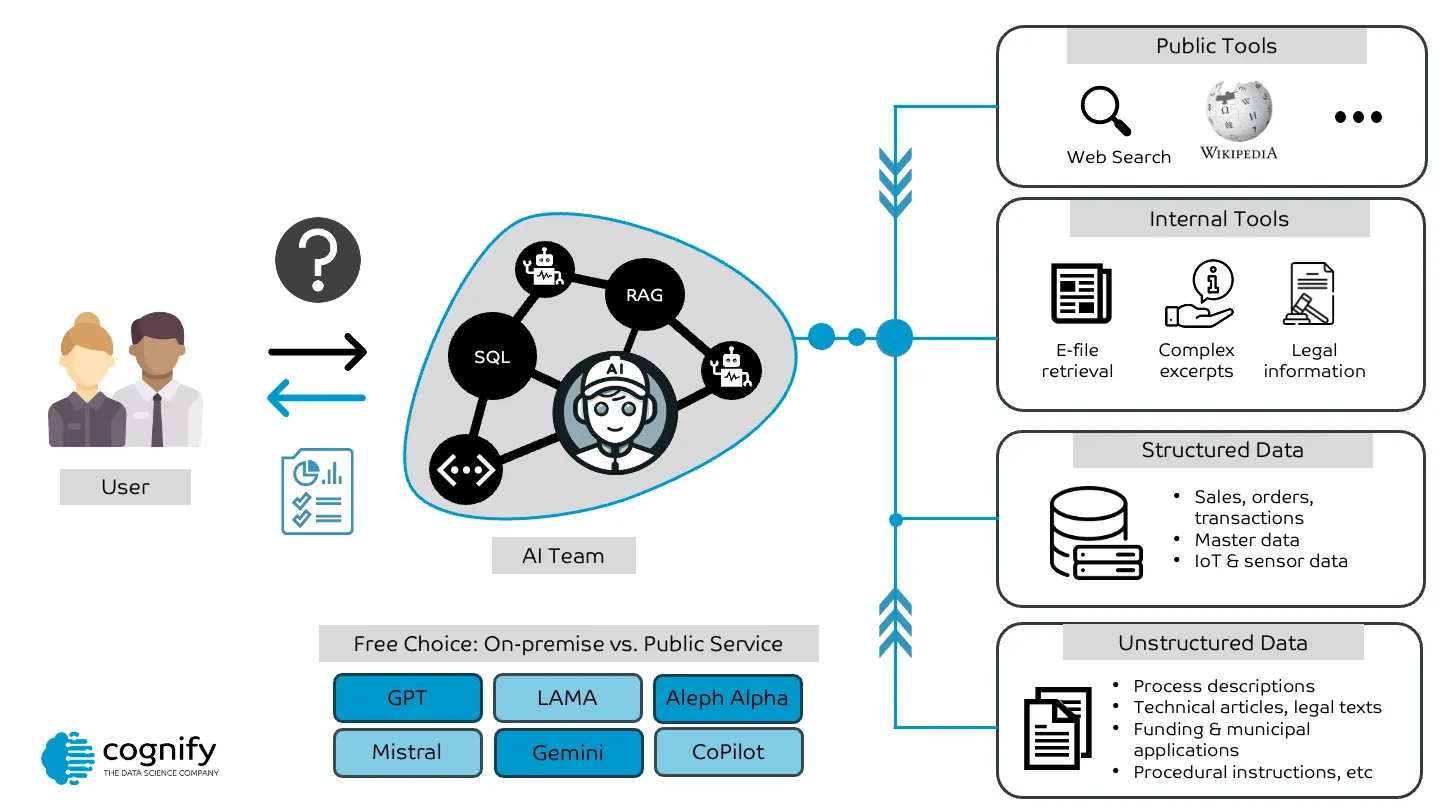LARGE LANGUAGE MODELS (LLMs)
Integrative AI Solutions with Language Models
AI language models (LLMs) open up immense upotential for companies. From increasing efficiency and automating complex processes to optimizing decisions - the possible applications are diverse and offer sustainable competitive advantages. We will show you the main areas of application and how your company can improve its service and increase the efficiency by using LLMs.
Requirements for Successful Applications
The rapid development of LLMs has the potential to fundamentally change the corporate landscape. Gartner predicts that AI will be integrated into 75% of enterprise applications by 2025. Companies that invest in AI technologies are positioning themselves for the future and laying the foundation for long-term success. To successfully implement advanced AI applications, organizations must meet certain requirements, including a high level of digital maturity and a solid data infrastructure. Consistent data is crucial, as AI models are only as good as the inputs used to train them. We support companies in setting up customized data architectures that enable the flexible integration of internal and external data sources. If your company is located in a security-critical sector (e.g. according to NIS-2) or is ISO 27001 certified, we take measures in the system architecture of LLM-based solutions to ensure the corresponding conformity, also with regard to governance and GDPR obligations.

Application Examples
Language models and solutions based on them offer a wide range of possible applications in companies. Here are a few examples:
-
Marketing content creation: LLMs can help creating content by generating blog posts, social media posts, newsletters, product descriptions, images and more.
-
Customer support: An LLM-based chatbot can respond to customer inquiries around the clock, answer frequently asked questions (FAQs), track orders and provide basic technical support that can easily make up 80% of the work effort.
-
Translation and localization: LLMs can be used to quickly and accurately translate and localize content into multiple languages (language adaptation to target country), allowing companies to expand their reach into international markets.
-
Customized reports: LLM agents can customize distributed and ongoing new information to your employees on a daily basis. This can be made available in the form of a morning post, a classic chat bot or in the corresponding routine in order to anchor data-driven decisions natively in your corporate culture.
-
Classic work preparation: LLM agents prepare processes semi-automatically by analyzing documents and extracting and structuring information. This reduces processing times and errors. Regular updates ensure efficient and correct process runs.
-
In-house knowledge base: LLMs can support employees by a centralized access to relevant information with according search capabilities. This leads to less screening of stale documents and efficiency while improving transparency of available data.
-
Support with internal guidelines: LLMs assist in adhering to interal rules by automatic creation of documentation, reviews or internal audits. Furthermore, work outputs and status can be easily validated and monitored.
-
Intelligent contract analysis: Legal documents are analyzed, risks are identified and standardized contracts are created. This increases efficiency and minimizes risks, while saving costly legal assistance in the first steps.
-
Dynamic marketing dashboard: LLM aggregates marketing data, analyzes campaigns, calculates ROI and creates personalized reports and visualizations.
-
Multimodal project management assistance: LLMs support project managers with real-time reports, schedule coordination and optimization suggestions.
-
Automated financial reporting: LLMs consolidate financial data, perform analysis and create reports for informed decision-making.
Example: Integrative Solutions for the Public Sector

How Can cognify Support Your Company in the Integration of LLM-based Solutions?
How Our Customers Benefit
The use of LLMs makes it possible to support and even automate a large number of more complex tasks and leads to considerable efficiency gains. Employees can concentrate on more strategically important activities that create greater added value for the company. In particular, recurring tasks such as the formal review of application documents, the creation of sales reports or the processing of support requests can be automated, saving time and resources.
The productivity of the workforce is significantly increased through the support of LLMs. AI-supported systems are able to process large amounts of data in near real time and make well-founded decisions. This leads to faster responsiveness and improved decision quality. McKinsey estimates that AI could generate annual added value of up to 13 trillion dollars by 2030 by driving productivity gains and innovation.
Despite this great potential, it is important to bear in mind that AI also has a distorted perception (bias) of our world due to the data on which it is based and that, in addition to data privacy issues, humans are still needed (“human in the loop”) to ensure consistent and honest decisions.